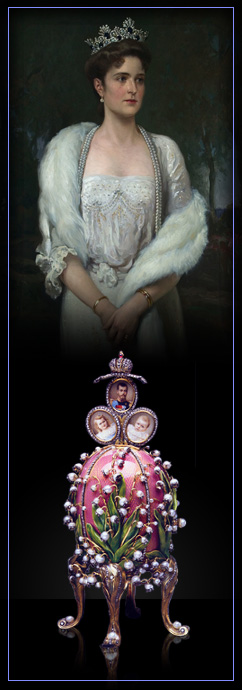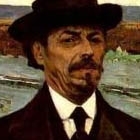Why a web page may look different on different computers. This article that was written by Walt and is on the Pallasart site.


 Chapter VIIIJourneys in Russia and Beyond, 1896That summer the Emperor and the Empress undertook their first real journey through Russia, and went to the opening of a great International Exhibition at Nijni-Novgorod. The three days spent there were at the time of the annual fair, centre of all the commerce of Russia and the East, and in this also they were much interested. The Emperor was young then, and still believed that he would have time to see everything thoroughly and personally. At Nijni the Imperial couple received deputations from peasant elders from the whole country. The Empress ever afterwards cherished a dream that some day they would be able to go down the Volga, visiting all the towns on the great river's banks. This they were only able to do partially in 1913. After a short stay at Tsarskoe Selo, the Emperor and Empress started on the series of State visits to foreign Courts that are customary on accession to a throne. The first visit was to Vienna, where they stayed with the Emperor Franz Josef, arriving on August 27th, 1896. On all subsequent journeys the baby accompanied her parents, as the Empress wanted to show her "precious treasure" to her great-grandmother, Queen Victoria, in England. The Empress Elizabeth of Austria, who had quite retired from Court after the tragic death of her son, the Crown Prince Rudolph, came especially to Vienna to welcome the young Empress and was exceedingly kind to her. This was the only time they ever met. Both the Emperor and the Empress fell immediately under the spell of the Empress Elizabeth's romantic personality, and never forgot the picture of loveliness she made at the State dinner at the Hofburg which took place, by the way, at five P.M., as the Emperor Franz Josef had remained faithful to the hour of his young days. The Empress Elizabeth had retained her great beauty. She was all in black, and her glorious thick hair had still kept its deep brown colour. She became very animated when talking to the Emperor and was charming. There was the usual succession of reviews and gala performances. The Emperor Nicholas went shooting with the Austrian Emperor at Lainz, while the Empress visited museums. The Imperial couple returned home through Kiev, and on their way had a great shock in the sudden death of the minister for Foreign Affairs, Prince Lobanov-Rostovsky, who was travelling with them, and who died from heart failure, after a walk at one of the halting-places on the journey. Prince Lobanov was an eminent statesman, and his loss was a great one to the country, and robbed the young Emperor of one of his ablest ministers, a loss which he keenly felt. At Kiev the Emperor and Empress visited different institutions and were much féted, for this was their first visit to the town. They went, among other places, to the celebrated Lavra (Monastery of the Caves, b.a.), a monastery where thousands of relics of saints are enshrined in catacombs like those of Rome. They were also present at the consecration of the Cathedral of St. Vladimir where the Empress saw for the first time the work of the painter Vasnetzov. The adaptation of Byzantine art to modern taste - his particular style - greatly pleased her and she was ever afterwards an admirer of the celebrated artist's work. After manoeuvres in the neighborhood of Kiev, the journeys abroad were resumed. At the Emperor William's invitation the Imperial travellers went to the German manoeuvres. They were met at Breslau by the German Emperor and Empress and were joined there by Prince and Princess Henry of Prussia. The Empress was delighted that the official visit to Berlin was thus avoided, for she hated all formal receptions, and the stay at Breslau was very short, though it included the inevitable reviews and banquets, with the usual exchange of speeches and a gala performance at the local opera. Copenhagen was the next on the list, a day being spent on the way with Princess Henry at Kiel. Ten days were spent in Denmark with the Emperor's grandparents, the King and Queen, where a large family party had been gathered together to meet the Emperor and Empress. Their new yacht the Standart, then making her maiden trip, took the Emperor and Empress from Copenhagen to St. Abb's Head where they were met (on September 22nd) by the Prince of Wales and the Duke of Connaught on behalf of the Queen. From Aberdeen, where a naval review was held in their honour, Their Majesties went to Balmoral. Lord Pembroke was in attendance. They were escorted from Ballater to Balmoral by a squadron of the Scots Greys, of which the Emperor was colonel, and by Highlanders bearing torches. The Empress was impatiently awaiting the moment of seeing Queen Victoria again. Their meeting was very warm and affectionate, and the party was a purely family one, though the necessary official stamp was lent to it by the presence of the Baron de Stael, the popular Russian Ambassador, and of Cabinet Ministers in attendance, Lord Salisbury, the Duke of Devonshire, Lord Lansdowne, Mr. Arthur Balfour, and others. A large party of relations had gathered here also to meet the Russian Sovereigns. The Prince and Princess of Wales had come, the Duke and Duchess of Connaught, the aged Duke of Cambridge, Princess Louise, Marchioness of Lorne, Princess Beatrice, and the Empress's special friend, the Princess Helena Victoria. After the first solemn banquet, the ten days' visit was quite informal. The Empress went about as in old days with her cousins. Queen Victoria was happy at seeing her grown into so fine and blooming a woman, for she had been thin and drooping at her last visit, and suffering from acute sciatica. The Queen had always approved of her granddaughter's match and personally liked the Emperor more and more. This liking, did not, however, influence her political attitude towards Russia. It was her point of view, which was echoed by the Empress Alexandra, when she wrote to her sister, the Princess Louis of Battenberg, that "fan-lily ties don't count in politics" (March 3rd, 1897). The Empress's feelings at leaving Balmoral may be seen in a letter to Miss Jackson: BALMORAL CASTLE,The Emperor and Empress embarked at Portsmouth for France. To this visit great importance was attached by politicians both in Russia and in France. No Russian Emperor had been to France since the Franco-Russian entente, and Nicholas II's visit was looked on as proclaiming to the world his continuation of his father's policy. In consequence, the French Government did all in its power to give its Imperial guests a splendid reception. Apart from the political motives that dictated the visit, the Empress was keenly looking forward to seeing Paris, where she had never been. She may even have had ideas of going about privately to see the scenes of the Empress Eugénie's splendor, of which she had heard so much from the Empress herself. The Russian Sovereigns, from the moment they set foot on French soil, were the objects of an unceasing ovation. When they reached Paris, this became positively delirious. The enthusiastic Paris public cheered them on every occasion. Even the baby Grand Duchess - now ten months old arriving quietly at another station and driving in her nurse's arms had her own private reception amid cries of "Vive le bébé et la nounou! " The Press was full of nothing but France's guests. Every detail of their mode of life was noted. Reams of poetry were written. The town was wonderfully decorated. In order to show Paris under its finest aspect nature not being obliging - all the chestnut trees had been covered with artificial blooms, which, if unseasonable, were still effective. Popular opinion at the time, as reported in the papers, considered that la dame du Tsar est bien belle. The programme of official functions and sight-seeing was much greater than the allotted time could contain. To the Empress's secret disappointment, there could be no private excursions. They could only hurry round the places of interest she had so much longed to visit. They rushed through the Louvre; she could not see a single gallery or museum; and as for shopping, which as a true woman she would certainly not have disdained, there could be no question of it at all. The newspapers reported that in an exquisite toilette de satin bleu she was present with President Faure and the Emperor at the laying of the foundation stone of the Pont Alexandre III; that she accompanied the Emperor to Notre Dame, where they were met in ceremony by the clergy, the organ playing the Russian anthem; that they visited the Pantheon and also the Invalides, where they stood before the tomb of Moscow's invader, the great Napoleon. They went to the Mint, and Sevres was visited on their way to Versailles, and at the china factory they were given as an appropriate present a bust of the Empress Catherine the Great. To the Empress, the most interesting day was the one at Versailles, where she was thrilled by the palace, its artistic beauties and historical associations. The rooms placed at her disposal were those of Queen Marie-Antoinette - to the suppressed horror of her suite who, superstitiously, found the associations ominous. A marvellous theatrical performance in the Salon d'Hercule was arranged after the State dinner. During the performance the great Sarah Bernhardt recited verses by Sully Prudhomme - a favourite poet of the Empress's. Here the "Divine Sarah" in the guise of a wood nymph of Versailles welcomed the Imperial couple, addressing a few special sentences to the Empress. Coquelin followed in the Sous-préfet aux Champs, R éj ane in another small piece. The best singers of the day appeared in the Seasons of Haydn, a small ballet closing a really wonderful performance. The last event of their stay was a review at Chalons on October 9th. They travelled from Versailles in the private train of Napoleon III, used for the first time since the fall of the Empire. It had been the acme of comfort and luxury when it was used by the Emperor of the French, but in 1896 it seemed strangely out of date in its old-fashioned elegance, and small in comparison with modern Pullman cars. Their stay in France and the warmth of the welcome they received remained an unforgettable memory to both the Emperor and Empress, and often in later years did the Empress delight the small Grand Duchesses with stories of Paris and Versailles. From France, the Emperor and Empress went to Darmstadt. This was a short visit, but a great pleasure to the Empress, who longed to be with her brother again after the first long separation in their lives. She had left, not knowing what the future had in store for her, and she returned as Empress of Russia. She went about very little, as she wanted to spend all the time possible with her family, but Hesse gave its Princess a splendid welcome. |
|
Alexandra Feodorovna was the last Romanov Empress of Imperial Russia. This online book - The Life and Tragedy of Alexandra Feororvna was written by Countess Sophie Buxhoeveden, Lady-in-Waiting to the Empress, who served the Empress for many years and followed the Imperial family into exile. |

- Early Surroundings
- Childhood
- A Young Princess
- Engagement
- Marriage
- Her New Home
- Coronation
- Journeys
- Charities and Life
- Queen Victoria
- Foreign Trips
- Birth of Alexis
- Gathering Clouds
- On the Standart
- Rasputin
- Her Family
- Empress at Home
- Last Years of Peace
- Wartime 1914
- War Work
- Without the Emperor
- Visits to Headquarters
- Before the Storm
- Warning Voices
- Rasputin's Murder
- Revolution 1917
- Abdication of the Emperor
- Prisoners
- Five Weary Months
- Tobolsk
- Ekaterinburg 1918





